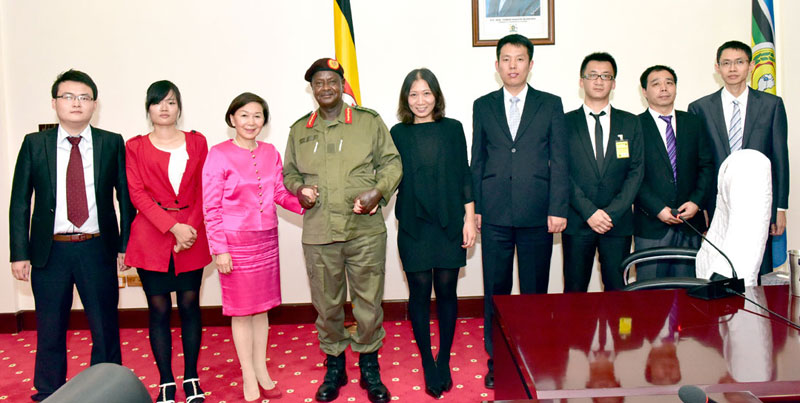News
How government has let Chinese push Ugandans out of business
Uganda needs to emulate Chinese policies of supporting their own

President-Museveni with-Chinese-investors-from-Guang-Zhou-Dong-Song-Energy-Group-which-was-granted-an-exploration-licence-in-respect-to-mineral-deposits-at-Osukulu in-Tororo
If the Chinese minister of Commerce Gao Huncheng was ever to make a tour around Kampala’s central business district, > he would certainly be gratified by the level of market domination his country has achieved in Uganda over the past few years. But a similar stroll by a Ugandan manufacturer would likely be a source of resentment at the way locally-made products are being pushed out of the shelves.
The past couple of years have witnessed unbelievable growth in the volumes of trade between China and Uganda, only that the trade has been sorely skewed in favour of China.
The rapid growth in China’s imports has been helped by the absence of a smart strategy by Uganda towards foreign direct investments coupled with unbridled free market access policies.
As Dr. Fred Muhumuza, an economist at Makerere University told The Sunrise, Uganda naively opened its doors to foreigners without a deliberate strategy to support local manufacturers.
Uganda has subsequently paid a heavy price as witnessed by the shrinking of its local manufacturing sector and the worsening of its trade deficit that hit a record low of US$-411m in June 2016. Uganda’s worrying Balance of Trade deficit comes amid aggressive trade promotion practices of countries like China.
Evidence of China’s aggressive stance in propping its own businesses could be seen by the way their Ambassador here Zhao Yali goes out of his way to try to ensure that Chinese business persons find a footing in Uganda either through accessing land, speedy business registration and access to capital.
Ambassador Yali has been nearly to all corners of Uganda where a Chinese investor is located, or wants to set up business with the view to supporting them.
Reliable sources tell The Sunrise that when a Chinese investor steps foot in Uganda, the Embassy offers to help him/her secure a work permit, access to land, access to low interest capital and two months of rent.
This is not to suggest that all Chinese investors get it all easy, but the support they get from their government home and abroad puts them in privileged position not only to compete globally but also provide employment to the thousands of young people in China.
Over the past decade, China has provided huge loans towards Uganda’s infrastructure projects. But the Chinese have used their smarter bargaining skills to prevent Uganda from taking advantage of the backward and forward linkages to its domestic industry such as providing inputs.
The case in point is the ongoing complaint by Ugandan steel and cement manufacturers who were prevented from supplying steel bars and cement for the multi-billion shilling Karuma Hydro power dam that is being built by the Chinese firm Sinohydro.
President Museveni has realised in retrospect the adverse impact of his wide open door economic policies.
In his address to Cabinet and Permanent Secretaries at Kyankwanzi late last month, President Museveni mourned the fact that Uganda’s total exports to China were just US$54.7m. Uganda’s export earnings from China are a miserable fraction of the more than US$800m that China makes from selling goods to Uganda. China is the second biggest importer to Uganda after India that makes over a billion dollars from importing pharmaceuticals and boda bodas.
In down town Kampala, China’s domination is palpable. Most if not all of Kampala’s newly constructed shopping arcades are filled to the brim with fast moving goods ranging from textiles, shoes, plastics of all kind, personal care products imported from China.
Although most of the shops are owned and operated by Ugandans, a growing number are increasingly getting occupied by Chinese nationals. The Chinese appetite for space is forcing landlords in Kampala to convert buildings into warehouses.
Ugandan manufacturers have for years lamented about the government’s apparent failure to nurture its own industry by exposing the nascent sector to direct competition from more advanced economies in China, India. But their pleas have fallen on deaf ears until some economists started to warn about the adverse effects of reliance on imports.
Ramathan Ggoobi, an economics lecturer at Makerere University Business School had warned government that it made a fundamental mistake to ‘remove the door’ by wholesomely opening the economy to foreign competition instead of maintaining some controls aimed at protecting some locally produced goods.
Dr. Muhumuza has argued that without a development bank to provide affordable long term credit to manufacturers, Uganda’s industry is doomed.
Coffee entrepreneur Andrew Rugasira said last week at BOU’s 50th celebrations that no country has ever developed by leaving entreprenuers on their own.
But Muhumuza points out that rather than concentrate our efforts on banning the Chinese from Participating in the retail business, the government needs to open up for a wider debate about how to boost the economy.
Comments


















